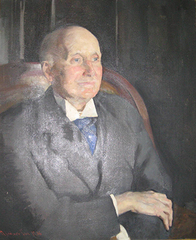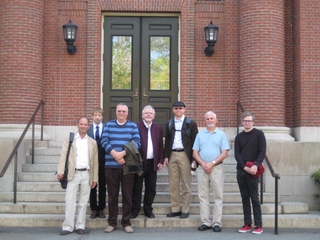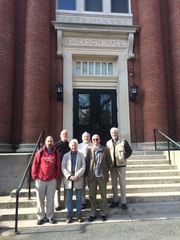Critical Edition of Whitehead
____________________________________________________________
Sabbatical reflections on the history of the Critical
Edition of Whitehead
February 6, 2015
I first realized the need for an edition while I was a
graduate student working with Jude Jones at Fordham University in the late
1990s (1998-2003). I had gone to the university library to find a copy of
Whitehead’s work, only to find that Whitehead’s various monographs were not all
shelved together in the philosophy section. Instead, Adventures of Ideas was
shelved with sociology, Aims of Education with education, and so on. I looked
enviously at the Complete Works of Dewey, with their handsome volumes all
consecutively shelved. I thought then, and think now, that it is a great
intellectual injustice that Whitehead has never been given a proper critical
edition. It was little more than a passing thought at the time, but I resolved
to see what, if anything, could be done about it.
After finishing my dissertation in late 2002 and graduating
the next spring, I took my first job at Mount St. Mary’s University in
Emmitsburg, MD. I set out to begin revising my dissertation for publication as
a monograph (The Ethics of Creativity). After publishing it in 2005, I then
turned my attention to other scholarly projects. One of those was exploring the
idea of the critical edition. Though not abandoning the larger project, I
started contacting scholars regarding the intellectual property status of
Whitehead’s last works, Adventures of Ideas and Modes of Thought. These works contained errors and, unlike PR,
had never been corrected. They also had nearly worthless indices. I recall
contacting Randy Auxier at Carbondale. He tried to dissuade me from the project,
saying that at best I’d publish one volume and then abandon the idea. I also
contacted the new Executive Director of the Center for Process Studies, Roland
Faber. Roland expressed interest in talking the project, but asked if
I could contact him a half-year later, as he was in the middle of moving,
applying for tenure, and getting married. So, I turned my attention to learning
more about the possible roadblocks to starting an edition project.
In my research I learned that a team involving John Cobb had
years earlier (in the 80s?) attempted to obtain NEH funding for a critical
edition, but were ultimately unsuccessful. Most scholars I contacted mentioned
the potentially problematic copyright status of the post-London works, which
are not in public domain. So, I set out to learn all I could about copyright
law and intellectual property as it pertained to Whitehead’s work. My various
searches brought me to Peter Farleigh in Australia, who was familiar with one
of Whitehead’s heirs, a certain Simon Whitehead. Simon is from the “British
side” of the family. Apparently A. N. Whitehead’s son, T. North, had divorced
his first wife and remarried. The son of his first wife is Simon’s father. I
believe it is considered the British side because at some point they had, well, returned to England. Contact with Simon proved fruitful, as he was able to put
me in contact with the person who held the rights to Whitehead’s estate and
intellectual property, a certain George Whitehead, who still lived in
Cambridge, MA, not far from A. N.’s home at Radnor Hall. George Whitehead was
the son of T. North’s second wife, and the person who inherited the estate when
his mother passed away. I was able to contact George, who was very generous in
his willingness to work with us. George wanted to do right by his grandfather,
agreeing to allow us to publish anything that was of scholarly significance.
Roland contact me again in 2006, asking if I’d like to be
the Director of Research and Publication for the Whitehead Research Project, a
new group that he had started the year before. I agreed, and the Critical
Edition of Whitehead was begun, with me serving as its Founding Executive Editor. In
2010 and at my recommendation, George Lucas generously agreed to join the Edition as
its General Editor.
The first phase of work focused on securing copyright
permission from George Whitehead, applying for funding from the NEH, and
scouring archives for anything by Whitehead. George Whitehead had confirmed
that his grandfather had instructed the family to burn his effects, so there had long been concern that traditional Nachlass was not available. However, searches soon
discovered an abundance of materials squirreled away in archives all over the
United States, Canada, and Europe.
Work securing funding was not quite so successful, with
failed attempts at NEH funding in 2009, 2010, 2012, and 2013. Fortunately, I
was able to find a private donor who was willing to help provide some financial
support. Starting in 2013, he donated $16,000 annually, increasing that to $20,000
in 2015. This money was used to hire graduate students at Claremont who could
help with obtaining materials, cataloging them physically, digitizing them, and
eventually transcribing them. The first Assistant Editor was Jeremy Fackenthal,
followed by Nathan Greeley, John Becker, and Joe Petek. Richard Livingston,
also a student, served as the technology consultant, making sure that we used
best practices in terms of digitization, storage, and presentation. After many invaluable contributions, Joe Petek was invited to serve as the Edition's chief archivist and Assistant Editor.
Along the way we became aware of two other projects that
related to the Edition, and which we hoped could be made part of the project.
The first was the plan by Nick Griffin at McMaster University and the Bertrand
Russell Archives to publish the correspondence between Whitehead and Russell
surrounding the writing of Principia Mathematica. Griffin was invited and
eventually agreed to make his volume part of the edition. The second project
was prompted by the discovery of notes at Mt. Allison University by Jason Bell.
Jason had discovered (among other things) notes taken by Winthrop Pickard Bell
(no relation) in Whitehead’s first year at Harvard. Jason contacted Randy
Auxier, who told him to speak to Dan Dombrowski, editor of Process Studies, who
suggested he contact me.
George Lucas and I agreed that it would be helpful to
convene members of the editorial board at Harvard to discuss the future of the
project. I successfully obtain a grant from the Hocking-Cabot Fund for
Systematic Philosophy and the editorial board met at Harvard University in
April of 2012 (see picture below). Around this time we also learned of Paul
Bogaard, an emeritus professor at Mt. Allison University who wrote his
dissertation under Ivor Leclerc. In July of 2013 George Lucas and I made a
visit to Mt. Allison and it was agreed that Paul would serve as the principal
editor of the first volume of the edition, with Bell’s notes as the center
piece.
The ultimate goal was always to publish both a print and
electronic edition. In the process of trying to determine the copyright status,
in 2009 I approached Free Press (which was formerly Macmillan and had been
bought by Simon & Schuster, a subsidiary of CBS) regarding possibly
publishing the critical edition. They said that they were no longer interested
in these sorts of projects. So, I began searching for another publisher, which
led me to a British firm called Pickering & Chatto. Negotiations began in
2010 and continued for several years. They tentatively agreed to publish the
edition and were included in several NEH grant applications. However, they were
slow to reply, and there was concern about whether they were the right home for
the project. In September of 2013, one of the members of our editorial board,
Leemon McHenry, contacted me regarding a conversation he had had with an editor
at Edinburgh University Press when he was visiting as an American Philosophical
Association fellow at the Institute for Advanced Studies in the Humanities. The
editor expressed interest in the Edition. After a year of negotiations and a
blind peer review of the proposal, a formal contract was finally signed in
March of 2014, with a contract for the first volume by Bogaard and Bell signed
shortly thereafter.
While on sabbatical in January of 2015, George Lucas, Joe
Petek, and I met at Claremont in order to plan out the next several volumes. I
had the previous year secured a grant from the Hocking-Cabot Fund to support
another editors' meeting at Harvard, this time with people who would actively
be editing volumes (see picture below). The meeting concluded with an agreement
to publish 5 volumes of Harvard lectures, 1 volume of Cambridge lectures, and 2
volumes of correspondence. George Lucas and I agreed to submit a proposal to be
editors of the second volume of lecture notes. The first volume of the Edition is
scheduled to be published in the spring of 2017. This work will likely continue apace for the next 30 years, including eventually not only these unpublished materials but also the monographs.
For more information about the Critical Edition more generally, including how to support it with a donation, visit our website here.

A picture of a portrait of Whitehead I took during our first editors conference in 2012. It hangs in the Bechtel Room of Emerson Hall, Harvard University. 
A picture of the first editors conference in 2012. From left to right: Leemon McHenry, Michael Halewood, Roland Faber, Helmut Maassen, Brian G. Henning, George Lucas, and Nathan Greeley. (Emerson Hall, Harvard University)
A picture of the second editors conference in 2015. From left to right: Joseph Petek, George Lucas, Nick Griffin, Helmut Maassen, Brian G. Henning, and Paul Bogaard. (Emerson Hall, Harvard University)
For more information about the Critical Edition more generally, including how to support it with a donation, visit our website here.